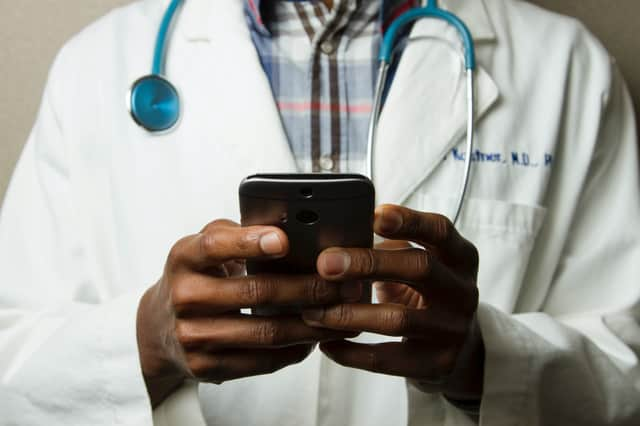Computer systems leave people ‘excluded and isolated’ from health services


So says Healthwatch Rotherham, an independent champion for people using NHS and other services.
A share of the population — some of them old, ill, or socially vulnerable — have been left behind by the digital revolution.
Advertisement
Hide AdAdvertisement
Hide AdAnd the cost-of-living crisis could mean people who can use the web will have to cut back on devices and their internet supply, Healthwatch concluded.
The watchdog insists health service providers “should focus on what is best for the patient...as opposed to what is most cost-effective and convenient”,
Its survey, undertaken over two months late last year, follows a report in the Advertiser earlier this month where we revealed the ratio of doctors who had face-to-face consultations with patients as opposed to remote dialogue.
About a quarter of appointments across the borough were carried out remotely, but surgeries in Rawmarsh and Greasbrough were dealing with most of their patients by phone or web link, according to NHS figures.
Advertisement
Hide AdAdvertisement
Hide AdThe latest study results come after Rotherham MP Sarah Champion launched an online-only survey on her constituents’ experiences of accessing GP, hospital, and ambulance services.
Since the Advertiser’s story, Healthwatch has weighed in, noting first how many NHS and social care services had initially drifted “from face-to-face to online” during the Covid pandemic.
Their report said: “Many services still use digital communications to deliver important information to patients, including hospital letters, post-operation information, and care home directories.
“Whilst this is an efficient, cost-saving way to communicate to patients, it is not a ‘one size fits all’ solution, with many Rotherham residents feeling excluded and isolated from communications and information.”
Advertisement
Hide AdAdvertisement
Hide AdWhile Healthwatch recognised that the computer-literate majority can view “a wealth” of information, they also found that nine per cent of respondents did not own a smartphone, and 16 per cent did not have regular access to a computer.
There were risks of “people being digitally excluded from important health and social care information, feeling isolated and disadvantaged compared to others”, said the report, adding: “As the cost of living crisis continues, more people may struggle to access the internet due to the cost of running devices and paying for internet.
“It is important service providers are aware of this and can adapt their communications to ensure everyone is able to access the information they need in an appropriate format,” said the report.
Not everybody who does own a smart phone can steer themselves around health and social platforms, either.
Advertisement
Hide AdAdvertisement
Hide Ad“Nine per cent were not confident using mobile apps to carry out tasks, including booking medical appointments” according to the survey.
“This means they may not be able to use tools such as the Rotherham Health App or the NHS app to access health and social care information, book medical appointments, and access test results.
“Around eight per cent were not completely confident in using apps such as Facetime, Zoom, Skype or Teams.
“Less than half of respondents completely agree that communications from the NHS about their care or treatments are accessible.”
Advertisement
Hide AdAdvertisement
Hide AdPeople with health issues sometimes were found to have trouble navigating the web, with 15 per cent having a disability, impairment, or sensory loss that can make accessing information challenging and six per cent believing NHS communications were inaccessible.
Healthwatch concluded: “Thirty per cent of respondents believe that the way they access health and social care information is not right for them; 58 per cent would prefer face-to-face information.”
The age range of respondents varied from 18 to 80 but most were aged between 25 and 64.
The research was done on line, but there were printed forms too and personal engagement at Andy’s Man Club, Dearne Valley College and the Social Supermarket at Rotherham Minster.
CONCLUSIONS:
Advertisement
Hide AdAdvertisement
Hide AdSUMMING up the “multiple” criticisms from families contacting RMBC, Healthwatch said: “Respondents found it very difficult to find relevant contact details, sometimes impossible, having to contact several people to eventually get the correct number.
“There is an online form, but respondents feel this is not satisfactory when the query is urgent, or your form submission is ignored and there is no follow-up to contact you.
“As the cost of living crisis continues, we may see more Rotherham residents unable to access the internet as freely as they can now, resulting in them requiring health and social care information in other formats.
“It is essential that providers can reproduce all information in a variety of formats.”
Advertisement
Hide AdAdvertisement
Hide AdRMBC replied that they “take steps to make sure our website is user-friendly and accessible”, adding: “We have a review process as part of our everyday workflow.”
Almost comically, the council said its website was used incorrectly by visitors sometimes.
The search function stipulates, “Search this site”, but some users browse for topics such as EasyJet and hotels.com
“Despite common misconceptions, we do publish telephone numbers on our website for situations where it would be more appropriate to make contact over the phone, such as reporting a concern about a child or for emergencies,” said a spokesperson.
The NHS says its website is made “simple” for users, adding that more than 2,000 organisations share their content, including local authorities, charities, and commercial organisations.